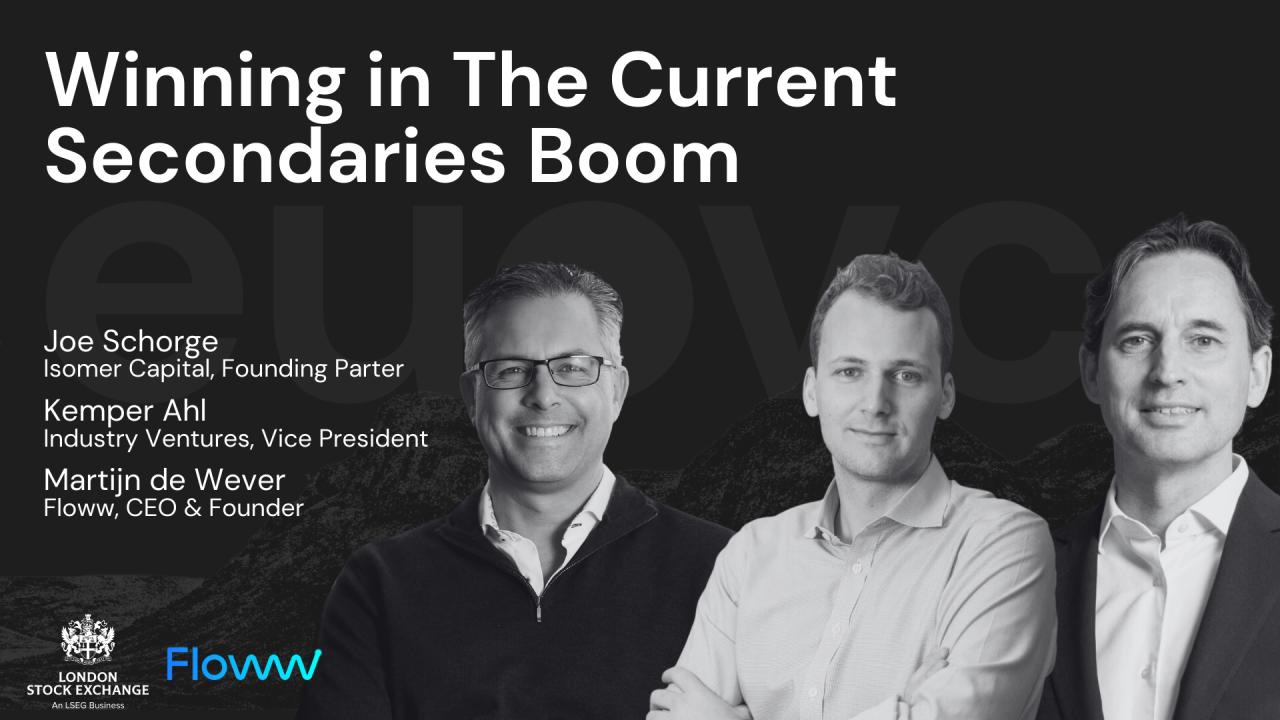
Today we are happy to welcome Robin Godenrath managing director and founding partner of Picus Capital. Picus is a privately financed venture capital firm with flexible long-term capital, managing an investment portfolio of more than 1bn EUR and was the first investor in European unicorns such as Personio and Enpal. Picus invest in early-stage technology ventures with a focus on financial services, HR, energy & climate, healthcare, logistics & mobility, real estate & construction, crypto & web3, deeptech and e-commerce. Picus predominantly makes initial investments in Pre-Seed, Seed and Series A ventures.
Chapters:
00:00:00 - Introduction to the European VC Podcast
00:02:17 - Shifting Priorities and Entrepreneurial Freedom
00:04:32 - Building a Systematic Approach to Investing
00:06:57 - Taking a Global and Industry-Specific Approach
00:09:12 - Balance sheet investing & Long-term Strategies
00:11:20 - Differentiating Factors for Picus
00:15:38 - Investing in Founding Teams & Mitigating Risks
00:17:46 - Deployment Rate and Portfolio Construction
00:19:48 - Investing in Cyber Security and Infrastructure
00:22:00 - The Impact of Generative AI
00:24:12 - Risk and Return Analysis in Decision-making
00:26:34 - The Double Down Strategy
00:31:06 - Successful companies built on technological risk
00:33:24 - The Importance of Exceptional Teams
00:35:46 - The Power of Networking in Hiring
00:37:53 - Reinventing the Organization
00:40:02 - The Importance of Radical Thinking and Innovation
00:42:09 - Embracing Extreme Outcomes
00:44:17 - Building Something Amazing with Picus
00:46:32 - Talent over Experience
00:48:49 - Tips for Emerging VCs and Fundraising
Today’s episode is brought to you in partnership with… Synaptic
Synaptic’s alternative data and intelligence platform lets you surface high-growth opportunities that were invisible earlier. Easily filter companies by your choice of industry, funding stage, geography and 100+ company performance metrics like user traffic, employee data, product reviews, and more! Our AI/Ml-based insights and automated alerts let you stay on top of your portfolio.
Join the tribe of data-driven investors!
Quote by Patrick Murphy, Tapestry:
“Seed investing requires a strong macro view on the world” ?
Robin’s take (paraphrased by yours truly!):
Robin found Patrick’s quote truly thought-provoking. Robin believes that many often underestimate the level of forward-thinking required in Pre-Seed and Seed investing. He noted that companies that are early entrants or first movers, such as Uber, AirBnB, Spotify, and Klarna, set a precedent, making it tough for subsequent entrants to introduce a competitive model, especially on a regional level.
While investors at later stages can wait to observe signs of product feasibility, adoption rates, product-market fit, user engagement, and scalability, those at the early stages don't have that luxury. Robin pointed out the unique approach of Picus in this regard, which places emphasis on formulating long-term hypotheses, studying trends spanning 10-15 years, and creating industry-specific teams.
Furthermore, Robin observed that, despite the global nature of tech trends, a significant number of venture capitalists have a more localized operational strategy. He highlighted how certain innovations tend to be region-centric, like finance emerging predominantly from Europe and AI from the US. Yet, regional disparities persist in terms of fund structures, mandates, teams, and incentives. To address this, Robin stressed the value of adopting a global matrix organizational structure, a principle that Picus fervently supports.
Robin commented on the exceptional approach and legacy of Sutter Hill Ventures, describing them as pioneers in the realm of Venture Capital. He held them in high regard, emphasizing their unparalleled commitment to delving deeply into DeepTech sectors. Robin admired their tenacity in formulating and acting on intricate and bold hypotheses without hesitation.
He also highlighted Sutter Hill's distinctive approach that deviates from traditional VC norms. Instead of following the conventional path, Sutter Hill zeroes in on industries undergoing transitions and emphasizes technical risks. Robin explained that their strategy is such that if their technical bets pan out, they essentially eliminate demand risk. This rigorous approach involves meticulous model selection, extensive consultations with potential customers and founders, and making significant macro-level investments.
Additionally, Robin noted an intriguing aspect of Sutter Hill's operations: a partner from Sutter Hill often dedicates about 40% of their time acting as a CEO for their portfolio companies. This allows the founders to primarily address technical challenges rather than business operations. Such a structure fosters agility, with Robin pointing out that these companies often maintain a lean team of 5-10 members until a product-market fit is established. This is feasible mainly because the business aspect is managed by someone else.
Robin also commended Sutter Hill's discipline in their investment strategy, emphasizing that they undertake only 2-3 high conviction investments annually, typically partnering with experienced operators. This strategy has borne fruit, with companies like Snowflake, which Sutter Hill practically launched, achieving market caps exceeding 50 billion. Such ventures have yielded substantial returns for Sutter Hill, with Robin highlighting the impressive 12 billion return from an estimated investment of 150-250 million. He also mentioned other successful ventures like Laceworks, Ghost, and Pure Storage, which have significantly contributed to Sutter Hill’s portfolio of over 10 unicorns in the past decade.
In conclusion, Robin appreciatedSutter Hill’s modest approach despite their monumental success. He noted their small but exceptionally talented team and their inclination towards focused, content-driven work rather than public grandstanding. Their prowess in hypothesis formulation and impeccable execution sets them apart in the venture capital landscape.
Q: What advice would you give your 10 year younger self?
Robin emphasized the importance of not placing undue importance on external factors like brands, salary, or the opinions of others. Instead, he underscored the value of self-reflection and discovering one's true passion. According to Robin, if individuals focus on what genuinely ignites their interest and envision themselves pursuing it for the next 15 years, success and financial gratification will naturally ensue.
Q: What are your top tips for emerging VCs across Europe who are fundraising ?
Robin underscored the importance of finding something in which you are better than anyone else or at least most of the others, can be a specific investment area based on a very forward looking hypotheses, can be a specific network you give access to, an investment style or approach - but do something different and bold which leaves you as one of very few choices in case you convince people about your approach
Q: What’s the most counterintuitive thing you’ve learned in venture?
Robin highlighted the potential pitfalls of raising capital at an excessively high or non-dilutive valuation. He pointed out that while it might seem advantageous initially, it could lead to unforeseen challenges down the line. Robin elaborated on the complexities of managing expectations, overseeing expenditure rates, and the implications it might have on internal signaling and momentum in the future.
Robin’s controversial statement:
"There's a difference of 20 hours a week between a job and a career."
Upcoming events
📺 Virtual events we’re hosting
Winning in The Secondaries Boom | 📆 Oct 31, 2023, 3:00 PM - 4:00 PM CEST
🤝 In-person events we’re attending
Hit us up if you’re going, we’d love to connect!
GoWest | 📆 6 - 8 February | 🌍 Gothenburg
GITEX Europe 2025 | 📆 23 - 25 May | 🌍 Berlin
Super Venture | 📆 4 - 6 June | 🌍 Berlin
Nordic LP Forum & TechBBQ | 📆 September | 🌍 Copenhagen



















Share this post